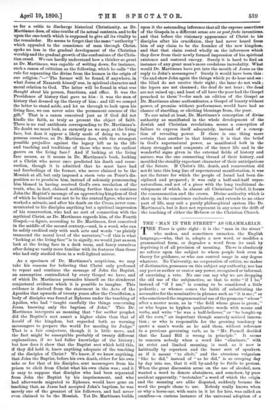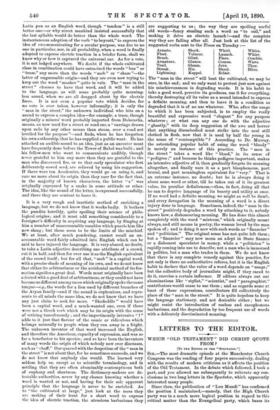THE "MAN IN THE STREET" AS GRAMMARIAN. MHE Times is
quite right : it is the "man in the street" who makes, and sometimes unmakes, the English
language,—who, that is, adopts a new word, or modifies a grammatical form, or degrades a word from its rank by depriving it of all precision of meaning. There is absolutely no referee upon the subject to whom people look even in theory for guidance, or who can control usage in any degree whatever. No University, no corporation of critics, no maker of dictionaries, possesses on this subject any authority, nor has any poet or author or orator any power, recognised or informal,
of exercising a veto. No one can say why we are dropping the old use of the subjunctive, so that to write "if I be," instead of "if I am," is coming to be considered a little pedantic ; or whence comes the habit of substituting the accusative for the nominative in phrases such as "it is me ;" or who sanctioned the ungrammatical use of the pronoun " whose" after a neuter noun, as in "the field whose grass is green ; " or who began to hyphen qualitative words with nouns and verbs, and write "he was a half-believer," or "he bought-np all the corn," an important though scarcely noticed innova- tion; or who is responsible for the growing tendency M quote a man's words as he said them, without reference to a previous governing verb, as in "Mr. Parnell decided that the Land Bill is wrong in principle." It seems to concern nobody when a word like "eliminate," with its strict and limited meaning, is used, as it now is habitually by reporters and the baser sort of speakers, as if it meant "to elicit," and the atrocious vulgarism "like he did," instead of "as he did," is so creeping day by day into use, that it will by-and-by be futile to protest. When the great discussion arose on the use of alcohol, men wanted a word to denote abstainers, and somehow, by pure accident apparently, "teetotaler," a word of which the origin and the meaning are alike disputed, suddenly became the word the people chose to use. Nobody really knows when or why a horse-car, with seats in it let for hire, was called an omnibus—a curious instance of the universal adoption of a
Latin pun as an English word, though " tandem " is a still better one—or why street mankind insisted successfully that the last syllable would do better than the whole word. The instantaneous adoption of the verb "to boycott," to express the idea of excommunicating for a secular purpose, was due to no one in particular, nor, in all probability, when a word is finally adopted to express electric traction in a briefer form, shall we know why or how it captured the universal ear. As for a veto, it is not lodged anywhere. We doubt if the whole cultivated class in combination could have ostracised the words " bus " or "tram," any more than the words " mob " or "sham "—the latter of unguessable origin—and they are even now trying to keep out the word "masher" quite in vain. The "man in the street" chooses to have that word, and it will be added to the language, as will some probably quite meaning- less sound, when we are all dragged about by the electric force. It is not even a popular vote which decides, for no vote is ever taken, however informally; it is only the "man in the street," the unknown individual who hits on a sound to express a complex idea—for example, a tram, though originally a miners' word probably imported from Dalecarlia, means, as now used for a street or road car, a "carriage drawn upon rails by any other means than steam, over a road not levelled for the purpose "—and finds, when he has forgotten his own authorship, that he has supplied a public want. He has attached an audible sound to an idea, just as an ancestor must have frequently done before the Tower of Babel was built ; and his fellow-men who want to communicate audibly, though never grateful to him any more than they are grateful to the man who discovered fire, or to that early speculator who first deliberately sowed seed, are relieved by using his suggestion. If there were ten Academies, they would go on using it, and care no more about its origin than they care for the fact that, in the majority of known characters, the letter " s " was originally expressed by a snake in some attitude or other. The idea, like the sound of the letter, is expressed successfully, and there they are content to leave it.
It is a very rough and inartistic method of enriching a language, but we do not know that it works badly. It bothers the pundits horribly, quite spoiling their science of philo- logical origins ; and it must add something considerable to a foreigner's difficulty in acquiring any language, by flinging at him a number of unaccountable vocables which puzzle him like new slang ; but those seem to be the limits of the mischief. We at least, after much pondering, cannot recall an un- accountable word fairly admitted into English which can be said to have injured the language. It is very absurd, no doubt, to take a Latin adjective describing one attribute of a crowd, cut it in half, and then for ever use it as the English equivalent of the crowd itself; but for all that, "mob" is a capital word, with a precise shade of meaning of its own, and we do not know that either its arbitrariness or the accidental method of its for- mation signifies a great deal. Words must originally have been selected with a good deal of arbitrariness, or they could not have become so different among races which originally spoke the same tongue—e.g., the words for a lion used by different branches of the Aryan family—and if the sound is euphonious, and repre- sents to all minds the same idea, we do not know that we have any just claim to seek for more. " Skedaddle " would have been a capital word, and a much-wanted one, even if there were not a Greek verb which may be its origin with the sense of retiring tumultuously ; and the impertinently intrusive "1" adds to it just that flavour of the comic or ridiculous which belongs naturally to people when they run away in a fright. The unknown inventor of that word increased the English, and therefore the American, capacity of expression, and was so far a benefactor to his species ; and so have been the inventors of many words the origin of which nobody now ever discusses, such as "chaff." Our quarrel with the despotism of the" man in the street" is not about that, for he sometimes succeeds, and we do not know that anybody else would. The learned very seldom help us, except as to scientific terminology, and in settling that they are often abominably contemptuous both of euphony and shortness. The dictionary-makers are de- testable authorities, never by any chance knowing whether a word is wanted or not, and having for their sole apparent principle that the language is never to be enriched. As to "the cultivated at large," just look at the mess they are making of their hunt for a short word to express the idea of electric traction, the atrocious barbarisms they are suggesting to us ; the way they are spoiling useful old words—fancy stealing such a word as "to coil," and making it drive an electric launch !—and the complete way they are failing after all. Just look at this list of the
suggested verbs sent to the Times on Tuesday :—
Armate. Shock. Whirl. Whizz.
Fleet. Vollmer. Launch. Whirr.
Brush. Glint. Flare. Crackle.
Armature. Glance. Course. Wave.
Trail. Gleam. Jove. Thor.
Streak. Hie. Shoot. Blizz.
Lightning. Keppel. Eclair.
The "man in the street" will beat the cultivated, we may be sure, in the end; and we only want to protest just now against his mischievousness in degrading words. It is his habit to take a good word, perceive its goodness, use it for everything, thereby destroying all its value as a sound intended to express a definite meaning, and then to leave it in a condition so degraded that it is of no use whatever. Who, after the usage to which it has been subjected, is to employ the really beautiful and expressive word " elegant " for any purpose whatever ; or what can any one do with the adjective "ghastly," with its deep suggestion of the awe and horror that anything disembodied must strike into the soul still clothed in flesh, now that it is used by half the young in the sense of "contemptible " ? According to Dr. Murray, the astounding popular habit of using the word " bloody " is merely an instance of this practice. The "man in the street" takes a word like "blood," in its sense of "pedigree ;" and because he thinks pedigree important, makes an intensive adjective of it, then gradually forgets its meaning altogether, and finally uses it as a part blasphemous, part brutal, and part meaningless equivalent for "very." That is an extreme instance, no doubt; but he is always doing it about some word or other, till he takes out of it its greatest value, its peculiar definiteness,—thus, in fact, doing all that he can to deprive language of its beauty and utility at once. If no word had a definite meaning, we might as well be dumb, and every derogation in the meaning of a word is a direct injury done to language. Sometimes, indeed, the" man in the street" positively degrades a word by attaching to it, nobody knows how, a dishonouring meaning. He has done this almost completely with the word "mistress," which originally meant always, and still means in poetry, the woman loved by the man spoken of ; and is doing it now with such words as " financier " and "politician." The original sense has not quite left them ; but a " financier " may now mean an adept in State finance or a dishonest speculator in money, while a " politician " is rapidly coming into use to describe, not a man who is immersed in politics, but a man who trades in them. We do not know that there is any complete remedy against this practice, for not only is there no authoritative referee, but it is the English habit to declare that the value of a word depends on "usage ;" but the collective body of journalists might, if they cared to do it, exercise a certain influence. If editors always cut out abominations like "stylist," "scientist," and " paragraphist," contributors would cease to use them ; and as regards some at least of these expressions, contributors fill collectively the place of the "man in the street." It is quite hopeless to keep the language stationary, and not desirable either ; but we might resist the introduction of useless and cacophonous barbarisms, and the degradation by too frequent use of words with a delicately discriminated meaning.



















































 Previous page
Previous page